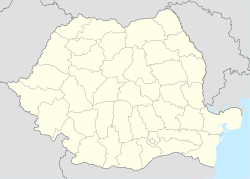Strehaia
| Strehaia | |
|---|---|
| Town | |
| Location of Strehaia | |
| Coordinates: 44°37′20″N 23°11′50″E / 44.62222°N 23.19722°ECoordinates: 44°37′20″N 23°11′50″E / 44.62222°N 23.19722°E | |
| Country |
|
| County | Mehedinți County |
| Status | Town |
| Government | |
| • Mayor | Simion Burcu (National Liberal Party) |
| Area | |
| • Total | 108.64 km2 (41.95 sq mi) |
| Population (2002) | |
| • Total | 11,846 |
| Time zone | EET (UTC+2) |
| • Summer (DST) | EEST (UTC+3) |
| Climate | Cfb |
Strehaia (Romanian pronunciation: [streˈhaja]) is a town in Mehedinți County, Oltenia, Romania. It is situated 25 km west of Filiași, on the Motru River valley. Forests in the vicinity are home to the largest Herman's Tortoise colonies in Oltenia.
Nine villages are administered by the town: Ciochiuța, Comanda, Hurducești, Lunca Banului, Menți, Motruleni, Slătinicu Mare, Slătinicu Mic and Stăncești.
At the 2011 census, the town had a population of 9,837. Of these, 88.79% were Romanians and 11.11% Roma; 99.4% were Romanian Orthodox.
Strehaia was first mentioned in documents of the 15th century. As an alternative location for the residence of Oltenian Bans during the early Craiovești rules, the town still features the foundation of the Banate estate house; it had replaced Severin due to frequent Ottoman attacks, and was in turn replaced by Craiova, remaining a largely rural locality.
The Monastery of Strehaia was built by Wallachian Prince Matei Basarab in 1645. In 1671, a cattle fair was organized in the town, a regular event which contributed to the town's development. Strehaia was the site of skirmishes between the Pandurs of Tudor Vladimirescu and troops loyal to Scarlat Callimachi, during the Wallachian uprising of 1821.
...
Wikipedia

